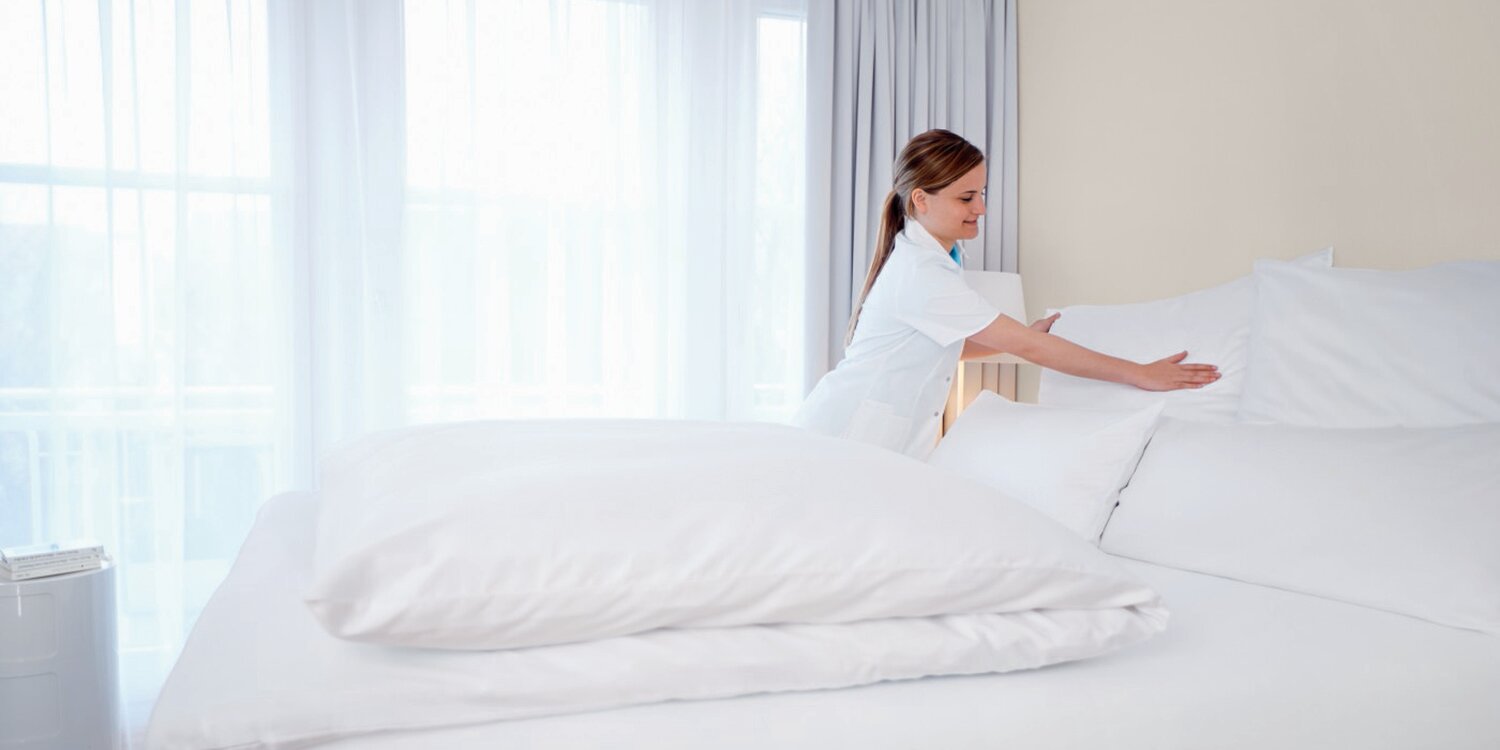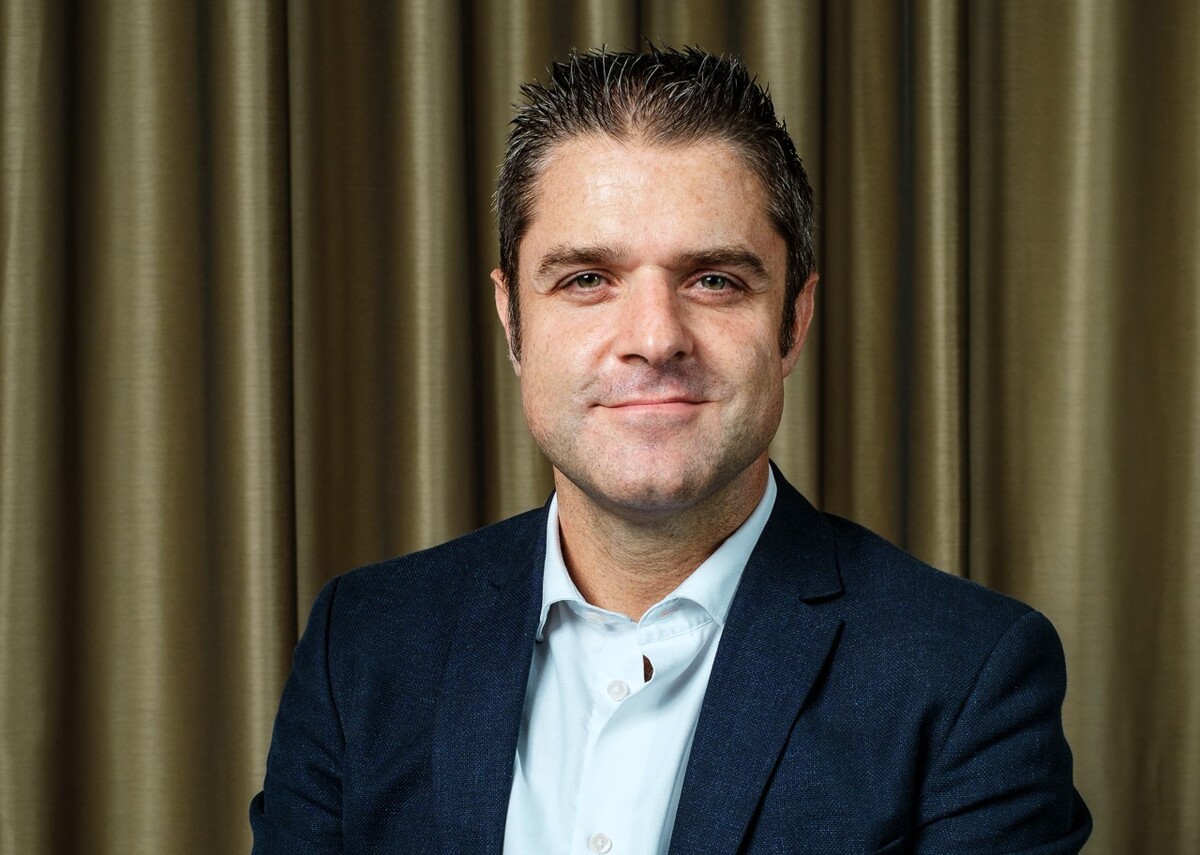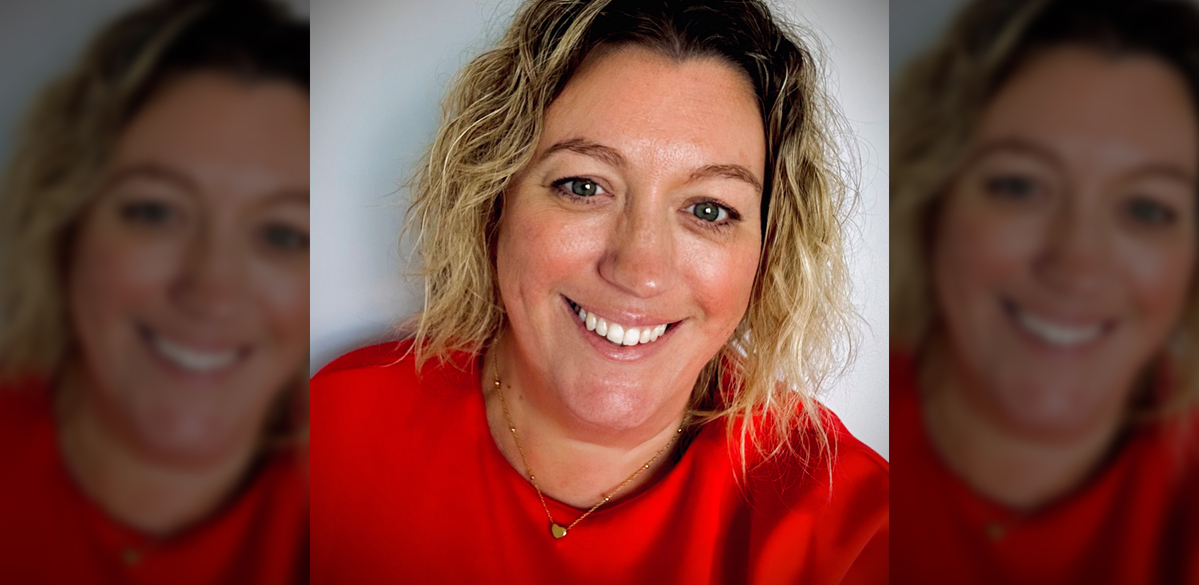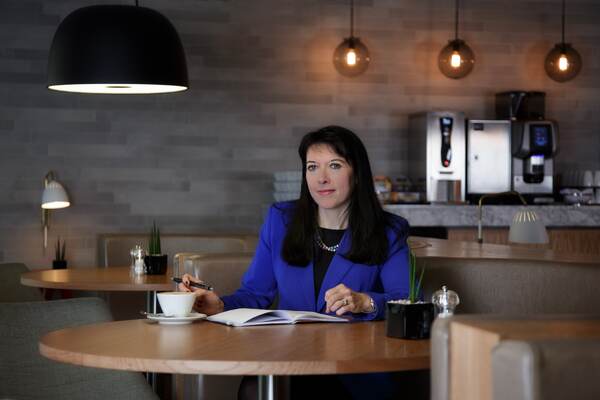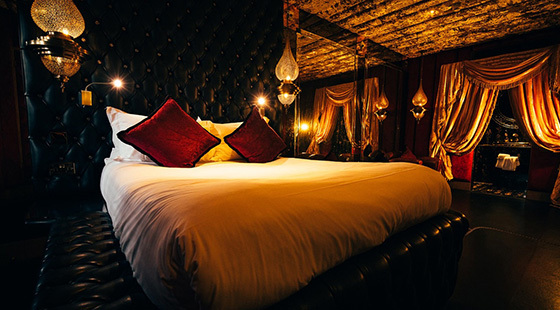Out in the wash: how to choose between in-house or outsourced laundry services
We all know the warnings about airing our dirty laundry in public and there are innumerable surveys and online customer reviews to remind hoteliers and restaurateurs of the perils of falling short on the linen and workwear front.
“Customers expect the very best, whether they are heading out to dinner, staying in a hotel or visiting a spa for a relaxing weekend,” observes Justine Abson, communications manager at laundry equipment supplier JLA. “Ensuring laundry such as bedroom linen, tablecloths, towels and bathrobes are all washed and disinfected correctly is key to your guests’ satisfaction.”
“While linen may be an expensive item to purchase, outsourcing laundry costs are generally the second-highest operating expense, next to labour”
Research by P&G Professional amplifies this point, explains expert advisory council member Liz Smith-Mills: “Over three-quarters of Brits (78%) sleep better in an impeccably clean room, with 61% stating that freshly laundered bed sheets are the most appealing attribute of a hotel room.”
In or out
Whether operators opt for on-premises (OPL) or contracted-out laundry solutions – or a mix – advances in appliance and IT technology, washing agents and fabrics are helping to meet guests’ increasing expectations for comfort and cleanliness while minimising costs, time and environmental impact.
“While linen may be an expensive item to purchase, outsourcing laundry costs are generally the second-highest operating expense, next to labour,” notes Smith-Mills. She recommends an OPL for full control over costs and quality because, “the washing programmes, processes, temperature and chemical choice can be controlled in-house to ensure linen is cared for in such a way that its life is prolonged and replacement costs saved.”
OPLs also allow operators to reduce on-site Periodic Automatic Replenishment (PAR) stock levels for dedicated linen – and to offer guests an on-demand, personalised laundry and dry cleaning service. Gemma Christie, business account manager at Miele Professional agrees: “According to our research, 76% of hotels use off-site laundries for at least some of their washing and drying, but only 37% were highly satisfied with the quality of service and 54% with levels of cleanliness. An OPL means being able to wash items whenever necessary, helping hotel staff meet tight room turnaround times.”
Space constraints need not be a deterrent. “It’s a misconception that OPLs take up a lot of space,” says Christie, “ Some suppliers offer laundry appliances that can fit into a small cupboard, and therefore don’t need to take up valuable space that could be used instead as an additional room.”
While pricier than domestic appliances, commercial machines soon pay for themselves in terms of durability and longevity and come equipped with shorter cycles for speedier turnaround times, adds Christie. Miele’s Little Giants washers are tested to run for 30,000 cycles (against just 5,000 cycles for domestic machines) and the range can wash and dry 6.5kg of laundry in 85 minutes, rather than the 3.5 hours typical of consumer equipment.
The right equipment
Christie advises operators to seek out machines packed with energy- and water-efficient features, such as the newest Performance and Performance Plus models in Miele’s Benchmark series that use 20% less water and 30% less energy than their predecessors, reducing both costs and carbon footprint.
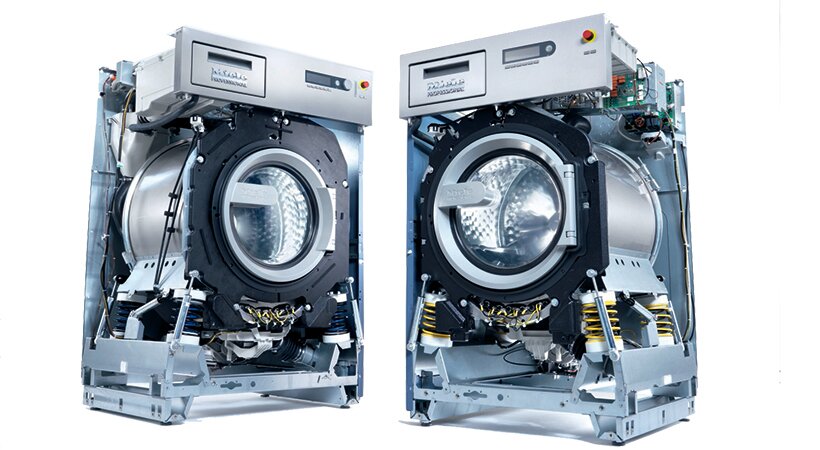
Wringing maximum benefit from an OPL requires professional-grade, accurately dispensed chemicals, says Smith-Mills, and P&G’s auto-dosing Ariel Professional Laundry System is available in three options on a no-cost loan with free installation. Surf White, the latest addition to Diversey’s Pro Formula range of professional cleaning formulations, is aimed at the 56% of smaller and independent foodservice, hospitality and long-term care businesses that its research found manage their laundry in-house. The powdered laundry detergent meets their key demands for a fresh smell (65%), stain removal (60%) and low-temperature performance (53%) via a technology that releases perfume slowly when the dried linen is used, an oxygen-based active ingredient to zap through curry, coffee and ketchup stains on low-temperature, 40ºC cycles, and active whiteners that keep whites white for 30-plus washes.
Leave it to the experts
Clients who outsource to specialist laundry services benefit from investment in the latest, most efficient large-scale laundry machines that use less water, energy and chemicals, reduce damage to garments, and provide high standards of hygiene and finishing, says Anna Freeman, head of UK marketing at nationwide workwear and linen supply and laundry specialist Elis.
Its service includes temperature and time monitoring, along with bio-contamination, cross-contamination and allergen controls.
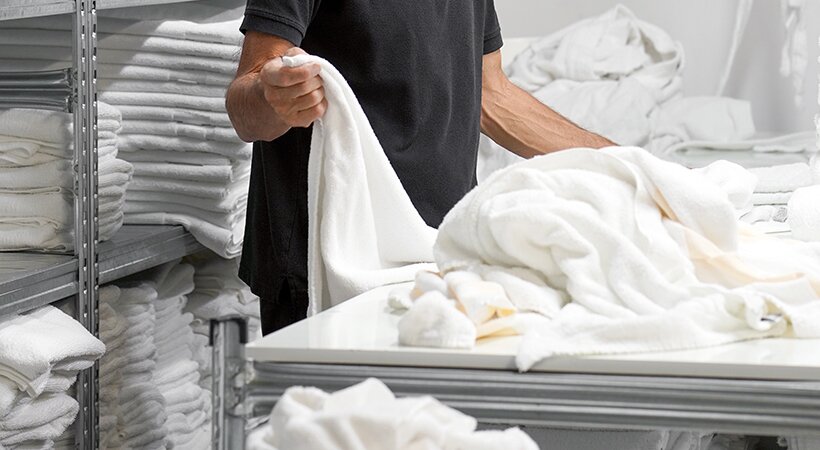
Additionally, says Freeman, “Studies have found that professional textile laundries can result in lower costs per kilogram of textile laundered, compared to on-site laundries, largely because investment in machinery and staff costs are divided between a high number of customers.”
Renting the linen and chef’s uniforms brings further benefits. “There are no up-front purchasing costs for garments or linen, so minimising capital expenditure,” Freeman adds. “There is also the option to switch chef’s wear sizes if staff change.” Elis’s ‘concept laundry’ process keeps each client’s items together to ensure the cleaning cycle is specific to their needs and to avoid losing items. For added security, all linen and workwear carries tiny radio frequency ID tags – which can even be allocated to specific wearers – improving stock control and visibility.
Cleaning specialist Diversey has harnessed wireless technology to power its new cloud-based laundry dispenser system, IntelliLinen, which works to optimise the performance and productivity of all connected laundry appliances.
It provides real-time and remote monitoring of wash cycles, energy and water consumption, chemical accuracy, machine downtime and day-to-day operational costs, along with actionable solutions. Operators receive alerts for general maintenance and for breaches of parameters they can set themselves.
Clean and green
Ozone gas (created from ambient oxygen) is a cost-saving, eco- and fabric-friendly solution gaining popularity in both OPL and commercial laundries. JLA has installed more than 2,000 of its Otex ozone-based systems across 1,200 sites, ranging from hotels and spas to hospitals and food manufacturers.
“Ozone is a chemical disinfectant which is produced and injected into the process – providing a powerful disinfectant that eliminates harmful micro-organisms during a cool wash cycle and saves money on utility bills,” explains Abson.
"For a hotel property, sustainability helps them win business as travellers become ‘greener’ and more environmentally aware”
Its efficiency on short-cycle, cool washes helps prolongs the life of linen (especially delicate fabrics) and ozone expands the fibres to make linen brighter, softer and fluffier. Russell Pannell, technical manager at detergent specialist Christeyns, points out another plus: “As there are no alkalis in our Speed O detergents, they are kinder to the soil and the ozone as well as cleaning the drains at the same time!”
Last April, the award-winning TDS Laundry in Isleworth, West London – which offers a bespoke service to privately owned hotels and beauty spas – set up four machines with Christeyns’ ozone-creating Speed O boxes, with a central auto-dosing system nearby.
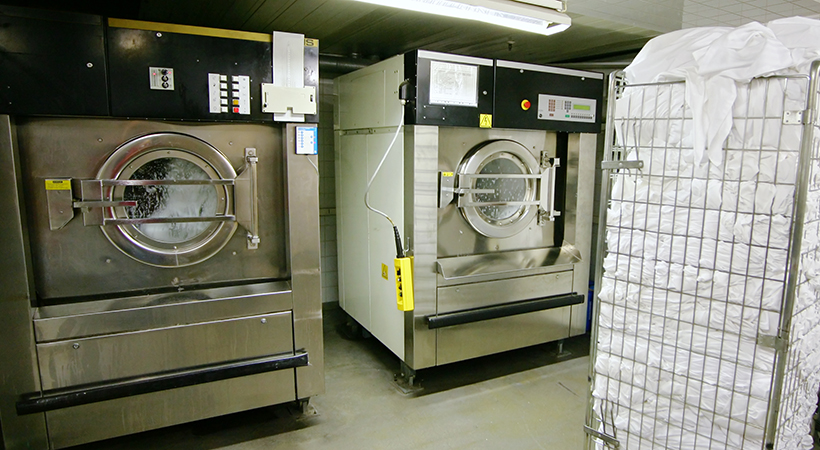
“Benefits were apparent from the word go,” explains owner Rona Tait. “We now wash in cold water for most items, our wash times have reduced from 45 to 30 minutes and we can process 80 loads per day instead of 70. In addition, our water and energy bills have reduced significantly. My staff like the system and the linens and garments are just as pristine as before.”
“Our customers and linen suppliers now look carefully at their supply chain and the practices they operate,” she concludes. “I hope this move to Speed O will open up new business as we prove ourselves to be a sustainable supplier. For a hotel property, sustainability helps them win business as travellers become ‘greener’ and more environmentally aware.”
###Smart solutions
Innovative fabrics and chemicals are helping operators cut laundry energy and utility costs while prolonging the life of their linen, as these new offerings illustrate.
SmartKnit
BC Softwear has added SmartKnit towels to its SmartSoft Collection of sustainable, energy-saving SupremeSoft bathrobes and spa linen that are designed to offer hotels, spas and laundries significant savings in energy use (70%), drying times (40-50%) and water consumption (43%).
Like the robes and linen, the new towels absorb up to 65% less oil than traditional terry towels, meaning fewer wash chemicals and shorter drying cycles at lower temperatures. They must be laundered separately from traditional towels to reap the savings in energy (8.5%), water consumption (5%) and drying time (9.2%).
The towels – available in three sizes, three colours (white, pebble and slate grey) and multiple thicknesses – feature a knitted weave to prevent pulling or tearing, while the robes combine a super-soft outer with a towelling lining to meet what marketing manager Laura Johnson describes as an emerging trend in hotels for lighter-weight fabrics that still feel luxurious.
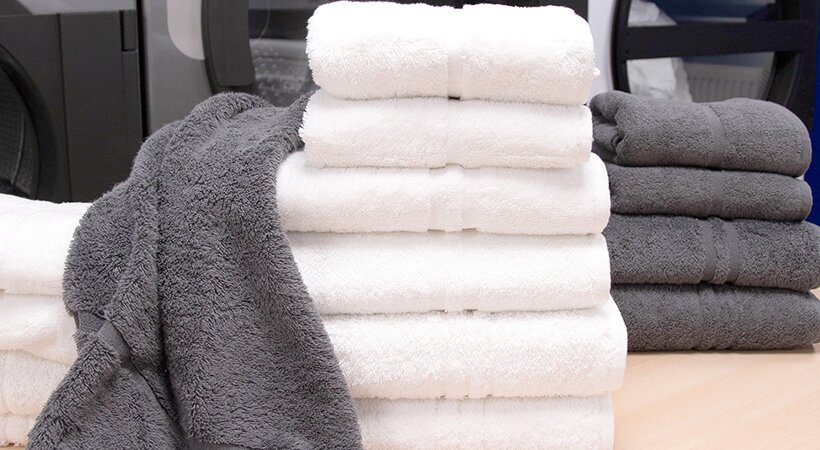
Smart Shield
Smart Shield is an innovative solution from international detergents and chemicals specialist Christeyns, designed to tackle the dark, almost impossible-to-remove stains caused by personal care products.
According to Christeyns’ research, 30% of hotel hair and skin products contain polyquaternium-7, a transparent and colourless substance present in the protective film of shower gels and shampoos that can transfer from skin and hair onto towels and bathrobes to act as a potent dirt, dust and dye magnet in the wash.
Used in the pre-wash, Smart Shield neutralises the positive charge of the polyquaternium molecules so they do not attract the negatively charged dirt particles. This means brighter colours, no need for a rewash and, adds operations director Justin Kerslake, “a reduction in the wasteful discarding of otherwise good linens”.
###Suppliers
BC Softwear www.bcsoftwear.co.uk
Christeyns www.christeyns.com
Diversey diversey.com/en/video-hub/intellilinen
Elis www.elis.com
JLA www.jla.com/otex
Miele Professional www.miele.co.uk/professional/index.htm
P&G Professional www.pgpro.co.uk
TDS Laundry www.tdscommercial.com



